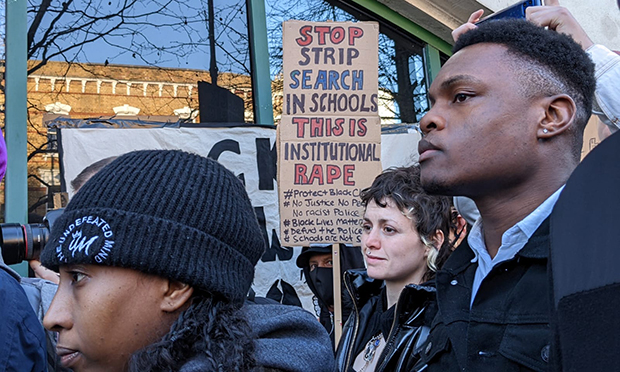Child Q: School at centre of scandal has made ‘radical changes’ after listening to pupils, according to new report

News of Child Q’s experience sparked protests across the borough. Photograph: Julia Gregory
The school where a Hackney teenager was strip-searched by police has made “radical changes”, according to a safeguarding report.
The Child Q scandal triggered a review of the police’s use of the tactic on youngsters that has led to calls for a “child-centred” approach.
A new report by independent children’s commissioner, Jim Gamble, said the school, which cannot be named to protect the girl’s identity, has made changes in the year since his initial investigation.
Chlld Q is taking legal action against the school and the police.
Four officers are being investigated by the Independent Office for Police Conduct on suspicion of gross misconduct.
The school has increased its safeguarding team and looked at its roles and responsibilities.
It has also launched dedicated safeguarding support and has a rolling audit programme to track issues.
Training has been expanded with a focus on “adultification”, where children, especially Black children, are treated as adults rather than youngsters by people in authority.
Gamble said adultification could have played a part in Child Q’s experience.
Pupils from a range of different Hackney schools told him: “Racism and adultification – it’s frustrating that this is only coming out now”.
One said: “I get adultified because of how tall I am […] so it’s about time people start listening to what we say and as females it particularly hits hard.”
Governors at Child Q’s former school also received training and the school council was reinstated so pupils’ voices are better heard after the shocking incident.
Students are also taught their rights, and the school has launched activities to promote anti-racism.
They also have regular meetings with the safer schools officer.
School leaders told Gamble they “are now placing significant emphasis on order, structure and discipline”.
The safeguarding expert said: “There is little doubt this approach helped address the chaos and drop-off in attendance that followed the publication of the review.”
Students told him “there is still work to be done” and said that although these priorities were important, “in common with pupils from other schools, they added the need for more focus on ‘fairness’”.
Gamble said it will take time for “relationships to be restored and for trust across the whole school to be rebuilt”, adding: “My sense is that by listening to their student population and by engaging parents and carers (a process I know the school has begun), they have every opportunity to do just that, but they are not there yet.”
He pointed out: “If the depth of insight established through my conversations is anything to go by, then it is the youth of Hackney who are best placed to help inform solutions.”
One child told him: “It’s hard for Black girls to maintain your hair. Want to wear it in an afro or wear a wraparound? We are not allowed to wear our hair out past our shoulders – but white girls are not told to tie their hair up.”
Others called for an independent place where they can report racist incidents.
“If a young person feels there is a racist incident, you can only report it to the school – but they are the ones being racist,” said one pupil. “There should be an independent line to report these incidents.”
Hackney Mayor Philip Glanville, Deputy Mayor Anntoinette Bramble, and community safety chief Cllr Susan Fajana-Thomas, said jointly: “We know there is excellent, forward-thinking and growing anti-racist practice in our schools and education settings.”
They pledged: “We will listen to and act upon what our children and their families are telling us. But we can’t do this alone, and will need the education system to support this work.
“These powerful and emotive testimonials may come from across Hackney but they give one clear message: Black and Global Majority people face or feel racism and suffer injustice from all statutory institutions.”
The politicians said work to create an anti-racist borough will take time.
“Lasting, systemic change is a deeply complex issue and there are no easy answers. We are prepared for difficulties and frustrations, for tough conversations and decisive action.
“But we are committed to justice and success – however long it takes.”
